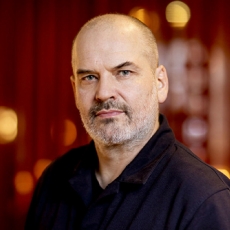Florian Boesch - Schumann & Mahler: Lieder - MusicWeb International
The combination Florian Boesch and Malcolm Martineau has worked together for quite some time now. In May 2009 I reviewed a Schumann programme with Heine-settings (review), including Liederkreis, Op. 24. It was awarded a RECORDING OF THE MONTH and even though I didn’t write so at the time I hoped that he would tackle the other Liederkreis, Op. 39 with Eichendorff-settings one day. That day has come now, or rather a full three years ago but not released until quite recently. Now in his mid-forties he is a well-established singer of both opera and lieder throughout Europe, collaborating with the most prominent conductors. The rapport between him and the ever flexible Malcolm Martineau was apparent also ten years ago and it has, if anything, deepened further.
Somewhat surprisingly he is designated as bass-baritone on Wikipedia, and looking back on my previous reviews I find that I was deeply impressed by his strong lower register. He employs it discriminatingly and with excellent effect also here, but what strikes me most is his rather restrained approach most of the time. These are first and foremost lyrical readings – sensitive and beautiful with delicate nuances and expressive colouring of the texts. In the opening In der Fremde in Liederkreis he also sports an elegant trill. Intermezzo has seldom been so lovely sung, and I have a feeling that Boesch feels this song – and indeed the whole cycle – from within. There is something about his timbre that tells me that it is music and texts that touches him very much. In a live recital he would probably have sung much of this with closed eyes. Waldesgespräch is vividly but inwardly characterized, and here he gathers strength for the last two lines, where he so tellingly exclaims: “Es ist schon spät, es ist schon kalt / Kommst nimmermehr aus diesem Wald!” (It is already late, already cold / you shall never leave this forest again!) in a dramatic outburst. I admire this economy with the means. Intensity is not just a question of volume. His declamation, also at pianissimo, conveys so much feeling. And it happens again and again: Die Stille – light and airy; Mondnacht – inward and beautiful; Auf einer Burg – so sad and melancholy, but so beautiful. In the second In der Fremde the poet is alone but he hears the nervous murmuring of the brooklet. The accompaniment guides the listener, suggests the presence of a nightingale, shows us the flicker of the moonlight and reminds the poet that in the castle garden in the valley, far away, his love is waiting for him – but no, she died so long ago. All those shifting impressions are graphically described through the sensitive word-painting. This is lieder singing in the highest division! And so it continues throughout the cycle with a jubilant Frühlingsnacht as the crowning glory. Words and music are welded together as an entity, tastefully presented in a beautiful packaging that in no way conceals the contents. The twelve songs that constitute this cycle are among the most beautiful that Schumann ever wrote. They may not have been more beautifully sung in recent times.
1849 was the centenary of Goethe’s birth and Robert Schumann, who had only set a few of his poems before that, attended a series of conferences about the cultural icon in Dresden. Inspired by what he heard and read, he composed the Mignon, Harper and Philine songs to poems from Goethe’s novel Wilhelm Meisters Lehrjahre¸a work where the flow of the prose is interrupted by songs that the characters sing. These poems are structurally quite irregular, and Schumann accordingly created musically irregular phrases and set them in a chromatic tonal language, far removed from the songs he wrote in 1840, the great lied year when his song cycles and other unforgettable songs poured from his pen in a steady stream of constant inspiration. Whether his mental health also affected his way of thinking in musical terms is hard to know, but he had since 1844 been engaged in setting Goethe’s Faust to music and suffered from nervous prostration in connection with that work. Some of the Faust music he had already finished was first performed in 1849. The melodic richness of Schumann’s earlier vocal music is sparser in these songs, but Florian Boesch is a splendid advocate for them with his expressive phrasing and sensitive nuancing. They may never be as popular as Liederkreis or Dichterliebe, but they are far from negligible.
The coupling of Mahler’s first song cycle Lieder eines fahrenden Gesellen, with Schumann may seem illogical, but any reading of these songs is welcome in whatever coupling when it is as good as this one. The characteristics of his Schumann singing are just as evident here: beauty of tone, intelligent and musical phrasing and intimate atmosphere. With piano accompaniment instead of orchestra the singer can scale down the nuances even further. I note the strongly accentuated accompaniment in the first song, probably depicting the joy of his beloved’s wedding day – the problem is of course that she is getting married to another. The sorrow he feels is very tangible in the rest of the song, though he tries to see the positive things in the nature around him. Ging heut’ Morgen über’s Feld is the happiest of the four songs, again he enjoys the beauty of nature and the refrain is: ”Isn’t it a lovely world?” But in the third he has a gleaming knife in his breast. “Despair” is the keyword and the intensity grows up to the final lines: “Alas! Alas! / I wish I were lying on the black bier / and might never open my eyes again!”, where all the pain is shouted out. This is the climax in the cycle, even in the whole recital, but even though his heart almost bursts he never goes over the top. The pain is strong but controlled. There are no histrionics. And then in the fourth song the pain is gone, he has reconciled with his fate but can no longer remained here. But, lying down under a tree he finds peace and everything is OK: “love and grief, and world, and dream!” The whole song and in particular the last lines are sung with such intimacy, like an inner monologue, so soft, like a whisper! An extraordinary reading.


